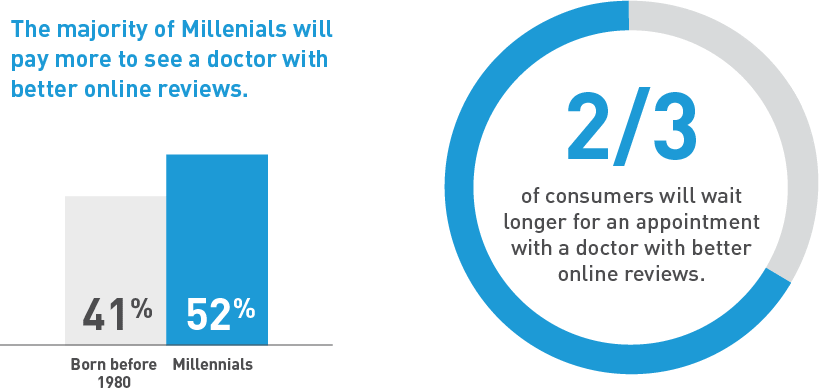Healthcare Consumer Survey: The Impact of Online Reviews on Selecting Providers
Reputation Staff Writer

Executive Summary
Brand perception begins online, with the local online reputation of doctors, clinics and hospitals.
In late 2017, Reputation.com set out to understand how consumers use the internet to look for healthcare services online, particularly when interacting with healthcare-related ratings and reviews. We surveyed healthcare consumers across the U.S. in a representative range of demographic groups for answers to some key questions:
- What are consumers and patients really looking for in online reviews?
- What ratings and review factors are most important when choosing a doctor?
- What sites are most used and trusted for this information?
Findings confirmed that online reviews are an essential part of the healthcare consumer’s decision-making. In this report, we’ll look at the key findings in detail.
Key Findings
- Google and health insurance websites are the two most important avenues for looking for a doctor online.
- People use ratings and reviews to choose a healthcare provider.
- Review content matters because customer experience details provide context and credibility.
- Consumers are willing to wait to see a doctor with a better review.
- Millennials trust Google most, while the other generations trust healthcare-specific sites.
Findings
1. Google and health insurance websites are the two most important avenues for looking for a doctor online.
Survey results revealed healthcare consumers are far more likely to use Google and health insurance websites than any other resource to look for doctors online—even more than healthcare-specific sites such as Healthgrades. This holds true for consumers searching for all types of care, including primary care, specialty care and immediate care.
Take Action
To attract new patients, you must have accurate contact and scheduling information about doctors, locations and services on Google and health insurance websites.
2. People use ratings and reviews to choose a healthcare provider.
Review content, volume, recency and average star rating have a direct impact on consumer choice.
Take Action
You must work with doctors and facilities to improve it, through actively monitoring, responding to and requesting reviews, as well as mining review content for insights into how to improve patient experience.
3. Review content matters.
Although star ratings help set the stage for consumer choice, the information contained in written reviews is more important to consumers than overall star ratings.
The most important factor in online reviews is how positive the review is (73%), followed closely by the recency of the review (72%) then overall star rating (54%). Quantity matters too-almost 80% of consumers want to read six or more reviews to fairly assess and select a provider.
Take Action
Consumers value written reviews left by patients. They want reviews to be recent and they want to assess at least six reviews before they make a decision. Ensure your providers
have processes in place for proactively requesting patient reviews following visits.
But what customers want doesn’t sync with what providers are delivering:
4. Doctor reviews affect your bottom line.
About two-thirds of consumers will wait longer for an appointment with a doctor with better online reviews. And, Millennials will pay more for a provider with better online reviews.

Take Action
Consumers are delaying care to see a doctor with better reviews. Millennials will pay more for doctors with better reviews. An Online Reputation Management strategy that encourages satisfied patients to review your doctors is key to success.
5. Millennials trust Google, while the other generations trust healthcare-specific sites most.
Our findings show trust in online information varies, depending on age group. Millennials trust Google more than any other source. Consumers born before 1980 trust healthcare-specific sites like WebMD and Healthgrades.
Take Action
It’s important to ensure you focus reputation management efforts on Google first, along with healthcare-specific sites and your own website. Stream reviews to your own hospital or clinic website, so consumers can have the information they need to make a decision.
Conclusion
Our survey confirms that online reviews are an incredibly important part of the decision making process. Consumers are paying more and delaying care to see physicians with strong online reviews and star ratings. But there is still a significant gap between the information consumers want — specifically six or more positive recent reviews — and the information delivered by most healthcare organizations.
As a Healthcare marketer this presents you with a compelling “first mover” opportunity. By focusing a portion of your marketing efforts on Online Reputation Management (ORM) you can dramatically increase your review volume and star ratings to capture business from these customers. And unlike other marketing tactics like advertising, ORM’s benefits extend beyond the initial customer engagement, delivering deep customer insight and laying the foundation for improved patient experience over time.
Below are some critical next steps healthcare organizations should take to ensure consumers have what they need to make informed decisions about where to seek care.
Next Steps
- Ensure accurate information about doctors and locations across the web.
- Focus efforts on Google first, along with healthcare specialty sites and your own website.
- Actively monitor, respond to and request reviews.
- Stream reviews to your own hospital or clinic’s website to increase visibility.
- Mine review content for insights into how to improve the patient experience.
